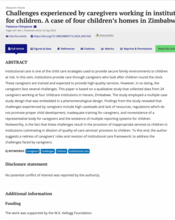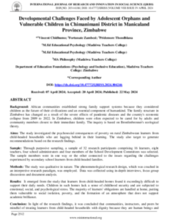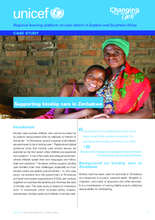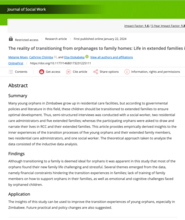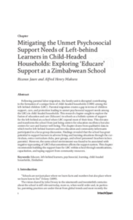Displaying 1 - 10 of 131
You’re invited to the upcoming webinar Including support for informal kinship care in policy on 6 November at 13:00 UTC. In this webinar, panelists will explore and demonstrate how kinship care can be included in policy and supported without formalisation.
This paper is based on a qualitative study that collected data from 24 caregivers working at four childcare institutions in Harare, Zimbabwe. Findings from the study revealed that challenges experienced by caregivers include high caseloads and lack of resources, regulations which do not promote proper child development, inadequate training for caregivers, and nonexistence of a representative body for caregivers and the existence of multiple reporting systems for children.
This workshop explores why it is important to support care leavers networks, and how these networks can be supported. The workshop was designed and facilitated by care leavers, with presentations from a regional network working across Africa, and networks in Uganda and Zimbabwe.
The study investigated the psychosocial consequences of poverty on rural Zimbabwean learners from child-headed households who are lagging behind in their learning. The study also aimed to generate recommendations based on the research findings.
In this case study, the authors explore how the government of Zimbabwe and local civil society organisations (CSOs) are working together to maximise the benefits and minimise the risks of kinship care. The case study is based on interviews with 12 individuals which included policy makers, practitioners, kinship carers and children in kinship care.
Many young orphans in Zimbabwe grow up in residential care facilities, but according to governmental policies and literature in this field, these children should be transitioned to extended families to ensure optimal development. This article provides empirically derived insights to the inner experiences of the transition processes of five young orphans and their extended family members, two residential care administrators, and one social worker.
This webinar introduced new global inter-agency guidance on kinship care. During the webinar, panelists shared key lessons learnt on how to support kinship care, drawing particularly on examples of promising practices from South Africa, Zimbabwe, Liberia, and Brazil.
This video explores why supporting kinship care is so important, and examines how to support kinship care using examples from government and NGOs in Zimbabwe.
This 5th webinar of the Family for Every Child Kinship Care learning series looked at the different ways in which kinship carers themselves support kinship care. Kinship Care Ireland shared how the kinship caregivers they are working with are self-advocating for greater recognition for kinship care.
This research chapter sought to explore the fusion of education and care in schools in Zimbabwe as a holistic system of support for the left-behind at a school where left-behind children expend most of their time.

